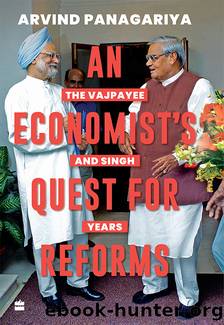An Economist's Quest For Reforms by Arvind Panagariya

Author:Arvind Panagariya
Language: eng
Format: epub
Tags: null
Publisher: HarperBusiness
Published: 2022-03-15T00:00:00+00:00
7
INDIAN GROWTH MIRACLE FACES THREAT
25 February 2010
THE SINGLE-MOST IMPORTANT REASON why India receives as much attention worldwide as it does today is its perceived economic potential. At $1.25 trillion in GDP, the country currently accounts for only 2.2 per cent of the world GDP. It ranks a low twelfth in economic size despite a population of 1.2 billion and comes behind the remaining three BRIC (Brazil, Russia and China) countries. Yet, India cannot be ignored because if it fulfils its promise of near-double-digit growth over the next two decades, it would become the third- or fourth-largest economy in the world.
But nothing is ever carved in stone in the world of economics. In the 1950s, India used to be seen as a rising star while South Korea was viewed as a basket case. But dramatically different policy choices by the two countries led to exactly the opposite outcomes by 1980. Fortunes began to turn for the better for India only after it corrected its policy course, first half-heartedly in the 1980s, and later, beginning in 1991, with greater determination.
Sadly, however, complacency has returned at the top policy levels. The countryâs leadership has come to view Indiaâs destiny as a great world power as inevitable. Even those such as Prime Minister Manmohan Singh, Home Minister P. Chidambaram and Planning Commission chief Montek Singh Ahluwalia, who had fought hard for economic reforms in the 1990s, show little keenness for continued pro-market reforms. Indeed, the fear is no longer that the still-incomplete reform process will not move forward under the present government. That is now old hat. It is that there are realistic prospects of the clock being turned back.
At least three recent policy initiatives place a question mark on Indiaâs determination to hold the line on reforms, and therefore, on its emergence as a world-class power.
First, an Empowered Group of Ministers (EgoM) recently decided to forbid the import of foreign equipment for ultra-mega power projects. After three decades of piecemeal but consistent moves towards openness, one would have thought that India had left such blatantly protectionist policies far behind. By all accounts, the decision will make power projects more costly and cause significant delays in implementation. Auditing and consulting firms are reported to estimate that Chinese suppliers offer critical equipment at prices 10â15 per cent below their Indian counterparts and at least ten months faster than the state-run Bharat Heavy Electricals Ltd (BHEL).
The second disconcerting example of muddled-up thinking on policy is the recent proposal by the labour ministry to extend the existing Minimum Wages Act to the entire unorganized sector. The proposal not only raises the fine on violators from â¹500 to â¹5,000, but it also allows for six months in prison. Unlike in the past, the government appears determined to enforce the act through tougher penalties.
There are probably two motivating factors behind the proposal: as many as 93 per cent of the workers are in the unorganized sector and they receive an abysmally low wageâjust â¹50, compared with the national minimum wage of â¹100 per day, according to one newspaper report.
Download
This site does not store any files on its server. We only index and link to content provided by other sites. Please contact the content providers to delete copyright contents if any and email us, we'll remove relevant links or contents immediately.
My Bookstore by Richard Russo & Emily St. John Mandel & Ronald Rice(615)
Official (ISC)2 Guide to the CISSP CBK by Hernandez Steven(485)
Judgment of Paris by George M Taber(484)
Uncommon Grounds: The History of Coffee and How It Transformed Our World by Mark Pendergrast(479)
eCommerce Marketing: How to Get Traffic That BUYS to your Website by Thomas Chloe(440)
How to Build a Billion Dollar App: Discover the Secrets of the Most Successful Entrepreneurs of Our Time by George Berkowski(403)
Information Security Management Handbook, Volume 6 by Tipton Harold F(397)
Hit Lit by James W. Hall(391)
New Money by Lana Swartz(367)
Trade in the Ancient Mediterranean by Terpstra Taco;(361)
Cryptocurrency - A Trader's Handbook: A Complete Guide On How To Trade Bitcoin And Altcoins by Marvin Neuefeind & Marcin Kacperczyk(353)
THE SILK ROAD ENCYCLOPEDIA by Su-il Jeong;(326)
Manufacturing Consent by Edward S. Herman; Noam Chomsky(325)
Living with China by Wendy Dobson(306)
The Global Cosmopolitan Mindset by Linda Brimm(296)
Nonmarket Strategy in Business Organizations by John A. Parnell(295)
101 Things I Learned in Business School by Michael W Preis(293)
REVENGE OF THE PEQUOTS by KIM ISAAC EISLER(291)
Sacred Commerce by Matthew Engelhart(290)
